I am pleased to report that the refurbished vintage donation touring bike - also known as "the roadbike for women who fear roadbikes" - is ready! As often happens with these things, the project took longer than I anticipated. In the end we did not have time to put the bicycle together ourselves, and I entrusted the job to the saintly Jim at Harris Cyclery - which contributed the labor pro bono and donated the remaining parts my build was missing, thus becoming a sponsor of this project along with Velo Orange. My sincere thanks to them, as well as to all readers who contributed parts and funds to this effort. This is not yet the official give-away announcement, as I first wanted to show off some pictures and describe the bicycle in detail. I hope you like it!
So what exactly is this bicycle... It began as a vintage Shogun 400 touring bike that looked like this when I picked it up, but has been rebuilt from the frame up. When I spotted the original bike, I immediately thought it had potential. The early '80s Japanese cro-moly frame with relaxed geometry promised a comfortable, "Rivendell-esque" ride. And, despite the fairly small size (52cm), it looked like there would be no toe overlap, even with fenders. As many know, it is extremely difficult to find a roadbike in a small size, with relaxed geometry and no toe overlap - be it modern or vintage - which is what makes some of these unassuming vintage Japanese frames special. My idea was to start with such a frame and build it up with comfortable, functional components - ending up with an unintimidating "starter" roadbike that a beginner would be able to learn on without undue nervousness or discomfort.
The biggest priority was the handlebar set-up. When women tell me they cannot ride vintage roadbikes, much of the time this turns out to be because the handlebars are uncomfortable - lacking a sufficient "shoulder" area. Those who are new to drop bars often assume that they are all the same, but in fact there are dozens of models, with subtle variations in shape. I chose the Nitto Randonneur handlebars for this bike, which have long, flat "shoulders" and a slight, ergonomic flare to them that most cyclists find extremely comfortable, particularly on long rides.
I also chose modern Tektro short-reach brake levers, which are easy to squeeze from the top, even for those with weak hands.
Finally, I chose Silver bar-end shifters, which are much, much easier to use than downtube shifters and less awkward than stem shifters.
The leather handlebar tape is by Velo Orange. I had never tried it before and was glad to discover that it has a softer, more matte texture to it that Brooks leather tape (which I personally find a little too slippery).
Velo Orange Model 3 touring saddle. Saddle comfort is one of these things that is different for everyone, but I have to say that (somewhat to my surprise) I found this one more comfortable than the Brooks B17s I once owned. The leather is very different from Brooks leather, and I cannot speak for its longevity or durability. But for me, there was no "breaking in" period, and no pressure on sensitive body parts. I will soon write a review of this saddle with additional details.
Velo Orange hammered fenders, their pattern of indentations resembling a honeycomb. Later I will also post a comparison between the VO and Honjo versions of hammered fenders.
Velo Orange also provided the headset and their Grand Cru double crankset. It was exciting when these cranksets came out, because they are classically shaped yet affordable. Personally, I find the looks of chunky modern cranksets rather depressing, so it's wonderful that these are an option. I have not ridden with them except during my test rides of this bike, but I welcome readers who've owned them to provide feedback. The pedals included are MKS Touring pedals, which I have on most of my bikes and love.
The wheels are 27" touring wheels from the early '80s - a slightly nicer and cleaner version than the ones originally on the bike. The tires are the puncture-resistant Panaracer Pasela Tourguards. The headset, bottom bracket, chain, brakes, and front derailleur have all been replaced with modern components.
The rear cassette and derailleur are pretty much the only components that were left original. They are in good condition, but the downside is that the bicycle is only a 12 speed - as bikes of its era are. In order to upgrade to a cassette with more cogs, we would have needed to get modern wheels, which was beyond the scope of this project.
Here is a close-up of the bicycle's colour: an unusual champagne-lilac that I personally find very attractive.
The frame has been left original - frayed decals, rust spots and all - and I want to make it very clear that at heart this is still a vintage bike that looks its age, despite the updated components.
I received a Rivendell "SaddleSack" as a donation from one of my readers, but I think this bike works better with a Carradice. So I will let the recipient choose - either the SaddleSack, or one of my own Carradice bags, as shown here. I will soon post a review of the SaddleSack (pictured here).
And so that's it, in a nutshell. To my eye, this bicycle looks modestly beautiful, which is what I was aiming for. It is fairly light and is easy to carry. It is not "fast" by modern roadbike standards, so please don't expect to race or join paceline rides on it. Neither is it a bike for a tour of the Alps, since the gearing is somewhat limited by current standards. It is really meant to be a low-key, introductory roadbike for those with no athletic background, for those who want to explore nature while getting a bit of exercise, and for those who don't want to wear lycra and be all "serious" about roadcycling. If you've been unable to ride roadbikes in the past, this bike may be a good alternative to the ones you've tried. It is friendly. It is stable. There is no toe overlap. Lots of room on the handlebars for moving your hands around. Brake levers are easy to reach and easy to squeeze. Frame geometry is relaxed and won't hurt your knees. Having ridden the bike myself for a bit, it handles as comfortably and easily as I hoped. I've even ridden it in a dress and sandals, and it was great - just a really easy-going, "smell the flowers" kind of bike. Bicycles with drop bars are not for everyone - but this is as unintimidating of a way to try one as I can offer. I will announce the contest rules and timeline in the coming days, and I hope this bicycle will find the right owner.
I want to express my thanks again to Velo Orange, Harris Cyclery, and the generous readers who have contributed to this project: Justine, G.E., Neighbourtease, Spindizzy, Cedar, Somervillain, and others!
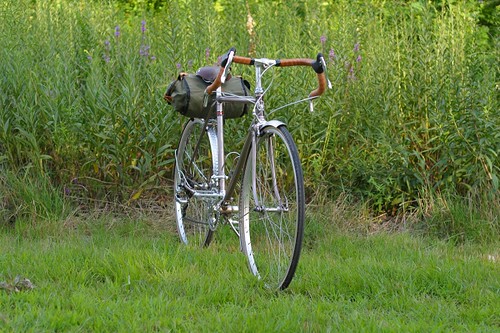
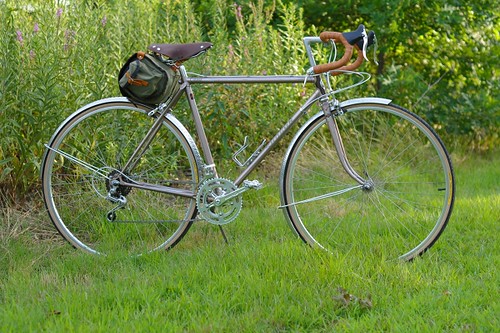
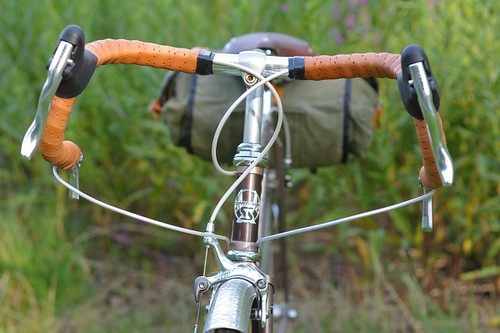
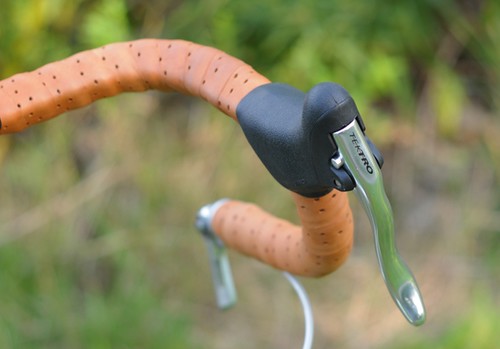
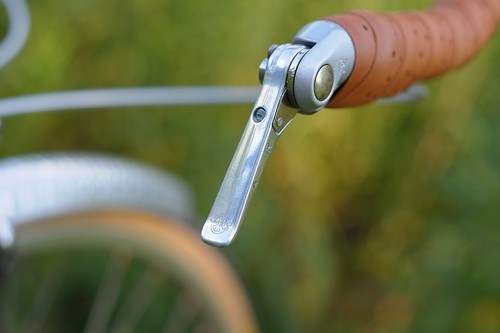
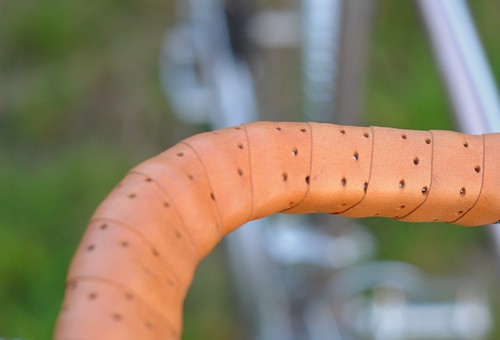
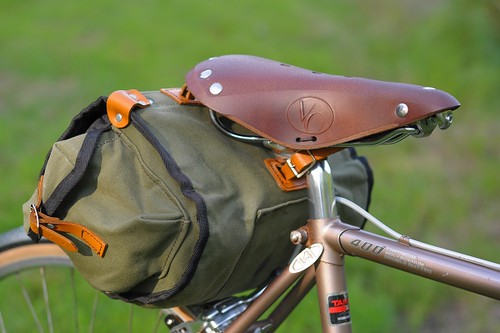
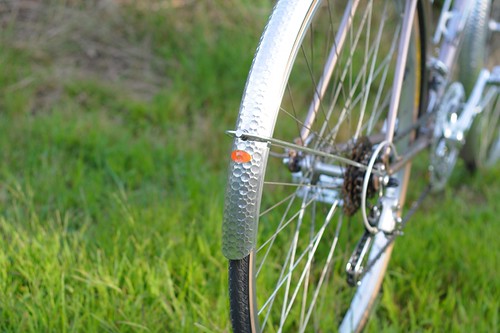
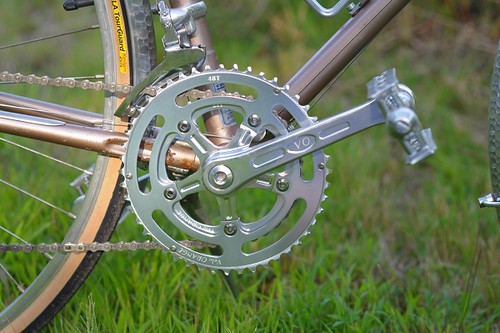
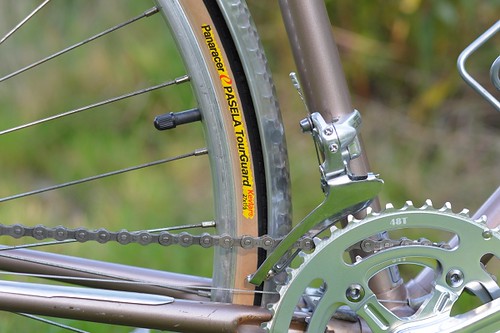
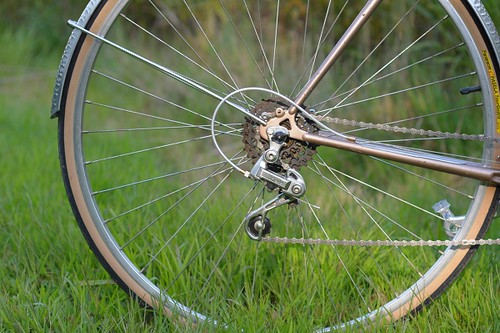
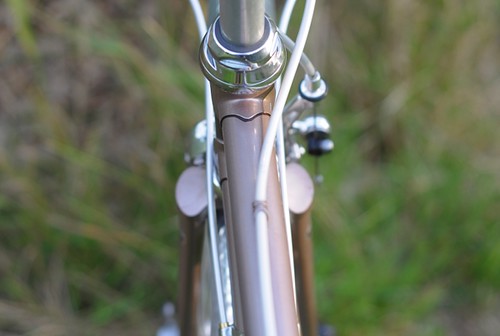
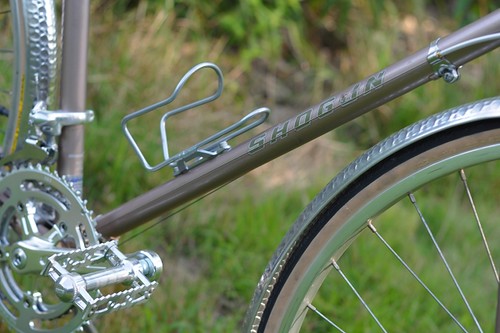
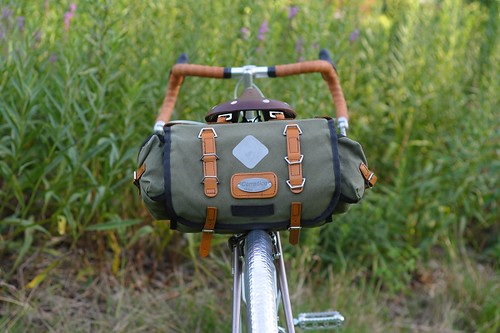
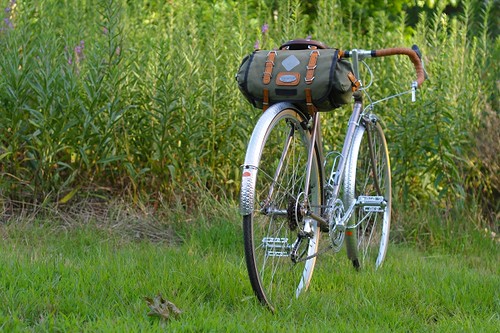





0 comments:
Post a Comment